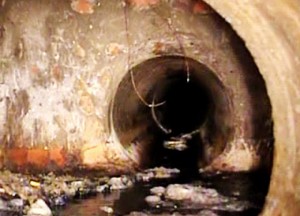The City of Laval has acknowledged that it has been dumping untreated water into the Mille Îles River, whence the current carries the sewage downstream to the St. Lawrence River.
“This often happens when rainfall or snowmelt overwhelms the city’s sewers,” Gilles Benoît, who heads the city’s environment department, told The Suburban.
Benoit explained that most cities in Quebec face the same problem.
“We have a water treatment system,” he said, “but when water levels are high, our wastewater plants are unable to treat all the water. It’s impossible.”
Higher levels of government have long been fully away of the problem, Benoît added.
“When Quebec implemented its first wastewater treatment program, everyone knew that we would be unable to purify all rain runoff and wastewater and, by design, often when it rains we divert part of that water to the rivers,” he explained.
“We have invested something like $25 million in the short term in Laval, and the Federation of Canadian Municipalities and Union des municipalités du Québec are clamoring for billions of dollars for wastewater treatment,” Benoît continued. “It’s a huge undertaking on a Canada-wide level that aims to rebuild our infrastructure by 2031, which gives you an idea of the immensity of the work that this will entail.”
He noted that the first phase of water treatment work has already paid off.
“We already see the effect in terms of the ecotourism on the Mille Îles river,” Benoît observed. “Now we’re in the second phase, which will permit us to go even further. We’ve capped the amount that we dump in the river, and are working to reduce the volume as much as possible.”
The revelation was nonetheless starkly at odds with Mayor Marc Demers’ uncompromising public stance against private pipeline firms during the past few weeks.
“[The Energy East pipeline] poses a safety hazard for Laval citizens, who have nothing to gain and everything to lose in terms of seeing their rivers and their land threatened by this infrastructure,” Demers said, Sept. 30.
However, in 2013, Benoît told The Suburban that the stretches of pipeline that traverse Laval don’t pose a direct threat to the Laval drinking water, because the city’s water inlets are upstream of the crossings.
Several gas and oil and jet fuel pipelines have crisscrossed Laval for more than a half-century, including the arteries that carry jet fuel to Dorval and Mirabel airports.
